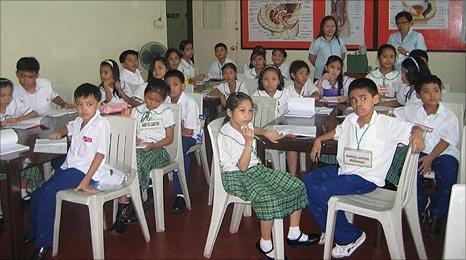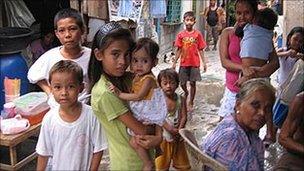Church vs state in Philippine sex education row
- Published

The Church believes parents, not teachers, should educate children about sex
A pilot project teaching sex education in schools is being rolled out across the Philippines. But the scheme is opposed by the powerful Catholic Church, as the BBC's Kate McGeown reports.
In a classroom in central Manila, a group of 11-year-olds are watching a video about the facts of life.
The children stare wide-eyed at the images on the screen - they are learning about the different parts of the male and female anatomy.
But soon after the video has finished, the teacher skips straight on to a discussion about pregnancy and birth; there is nothing at all about reproduction or even relationships.
This is not an oversight. In the Philippines, a conservative, predominantly Catholic country, even older students learn little about how to make babies, or - of more urgency according to many officials and health workers - how to prevent making babies.
But despite stiff opposition from the Catholic Church, this could be about to change.
Recently, the education department decided to launch a pilot scheme introducing sex education into the school curriculum from the ages of 11 onwards.
The former education secretary, Mona Valisno, who has just left office because of a change of government, spearheaded the campaign, saying it would empower schoolchildren to "make informed choices and decisions".
Strong backing
So far the plan is being tested in just 80 primary schools and 79 secondary schools around the country, but if successful the department wants to introduce it nationwide.

Women in places like Letre sometimes resort to drastic forms of birth control
The programme has the public backing of the United Nations - in fact it is even being partly funded by the UN Population Fund - and is something that many politicians have privately, if not publicly, wanted to do for a long time.
While there are few reliable statistics about the level of sexually transmitted diseases in the Philippines, there is a widespread suspicion that this is a serious problem.
In a statement in March, the health department admitted the country's HIV/Aids cases had reached "alarming proportions".
And the government frequently cites the country's rapid population growth - more than 2% a year, one of the highest in Asia - as one of the main problems it faces in trying to reduce poverty.
Promoting promiscuity?
But the Catholic Church sees the situation very differently.
Senior bishops believe the task of telling children about sex and relationships should be up to parents, not teachers, and that teaching sex education in schools, especially to young children, could have unintended consequences.

Medical workers like Kiko Dela Tonga (C) have welcomed the new initiative
"Children are fragile creatures. The [education] department should be very, very careful not to teach children about matters they will imitate the following day," said Monsignor Pedro Quitorio, a spokesman for the highly influential Catholic Bishops Conference.
He also said he did not agree with the view that a high birth rate traps people in poverty.
"The problem here is the distribution of resources," he insisted.
More than 80% of Filipinos are Catholic, and the Church's stance on sex education in schools has already blocked several government initiatives in the past.
The row also extends outside schools. Last year, a group of bishops succeeded in blocking a proposed law in parliament that would have made it easier for the public to access state-funded contraceptives.
This time, the education department has been careful to make a number of concessions to appease the Church.
According to Mrs Valisno, there will be no mention of abortion, or even contraception, during any of the new lessons. She said the scheme was not designed to emphasise the actual sex act, but to promote personal hygiene and interpersonal relationships.
It is an argument that has yet to sway the Church. Several bishops have publicly called for the programme to be dropped, and the conservative political party Ang Kapatiran (The Brotherhood) has gone even further, filing a legal petition against it.
Sex education in schools "promotes promiscuity among children... It does not promote the proper values that we want our children to receive," the party's leader Eric Manalang told reporters.
'Difficult situation'
For the estimated one third of the Philippine population living on less than a dollar a day, both sides of the argument must seem a world away.
Letre is typical of many of the poorer areas of Manila. It is little more than a slum, with homes crammed together and every corner teeming with children.
Kiko Dela Tonga, a member of Likhaan - an organisation working to improve women's health in communities such as Letre - welcomes the new sex education initiative, but says it does not go far enough.
"The plans involve teaching sex education as part of other subjects. How can you teach it in a subject like maths - one plus one equals three?" he said. "It needs to be a separate subject."
Mr Dela Tonga said there was an urgent need for better sexual health education in the community, citing research from the US-based Guttmacher Institute which found that half of all Philippine pregnancies were unplanned or unwanted.
At a health clinic he helps to run, a line of women were waiting for contraceptives - which are not banned in the Philippines but neither are they actively promoted.
One woman at the clinic, 20-year-old Camille, was even hoping to get her fallopian tubes tied [a form of female sterilisation] because she has already had two children and is pregnant with her third.
"It's difficult to be in this situation. I cannot have any more kids after this," she said.
It seems that while the arguments between the Church and the school system continue, people in the poorer parts of the Philippines are coming to their own - sometimes quite drastic - conclusions.